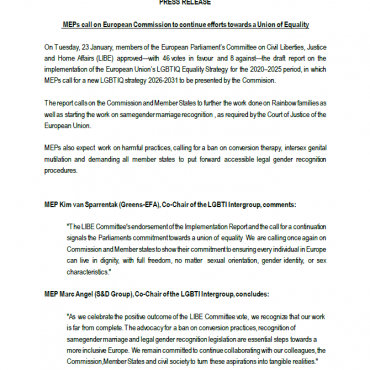MEPs take stock of LGBT rights in Bosnia and Herzegovina, Macedonia and Montenegro
Today, the European Parliament adopted three of its annual reports on the EU accession process for Bosnia and Herzegovina, the Former Yugoslav Republic of Macedonia, and Montenegro. Last month, MEPs already examined the situation in Serbia and Kosovo.

In its report on Bosnia and Herzegovina, the Parliament emphasises the need for an anti-discrimination strategy and for the implementation of anti-discrimination laws and policies. Furthermore, the Parliament calls on the authorities to investigate and publicly condemn the homophobic attack on participants at the Merlinka Film Festival in Sarajevo, which took place on 1 February.
In relation to Macedonia, MEPs welcomed the work done by the Anti-Discrimination Commission on homophobic school books. However, it reiterates the need for anti-discrimination legislation to be brought in line with EU law, and calls on political and societal leaders to condemn homophobic and transphobic violence.
The LGBTI Centre in Skopje suffered from multiple violent attacks over the past year.
The government of Montenegro was commended for its efforts in creating a strategy for enhancing the quality of life of LGBTI people, and for its support of Pride marches in Budva and Podgorica. But MEPs did highlight the need to educate the wider public about accepting LGBTI people.
The report also called on authorities to fully investigate homophobic violence, and prosecute criminal offences in a timely manner.
Richard Howitt MEP, author of the report on Macedonia and Member of the LGBT Intergroup, reacted: “It is unacceptable that LGBTI people still face violence, simply for being who they are. I call upon national leaders to condemn this violence in the strongest possible terms, and encourage the full inclusion of LGBTI people.”
Ulrike Lunacek MEP, Co-President of the LGBT Intergroup, added: “I am happy to see positive developments in Montenegro and Macedonia, but we cannot set aside the continuous large-scale discrimination and violence against LGBTI people in these countries.”
“We’ll remain vigilant, and keep addressing the homophobic and transphobic climate as an inherent part of the EU accession process.”
Read more:
- Read the European Parliament resolution on the 2013 progress report on Bosnia and Herzegovina (see paragraph 28)
- Read the European Parliament resolution on the 2013 progress report on the Former Yugoslav Republic of Macedonia (see paragraph 45)
- Read the European Parliament resolution on the 2013 progress report on Montenegro (see paragraph 26)
Image credit: © European Union






